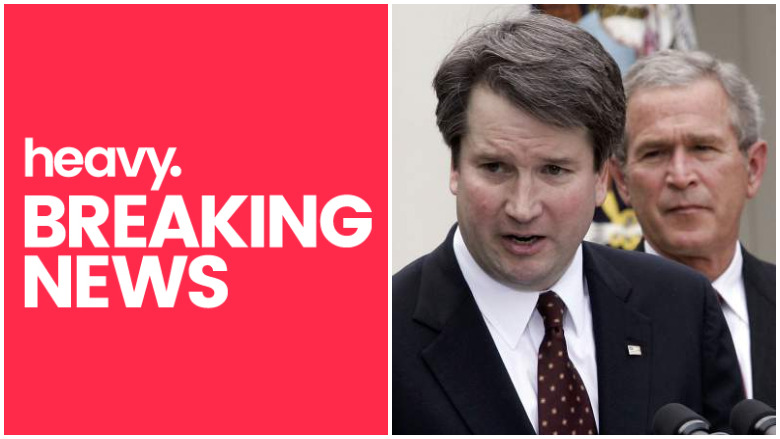
Getty Brett Kavanaugh's Obamacare dissent concerns some conservatives for what it says on the individual mandate of ACA.
Brett Kavanaugh’s previous ruling on Obamacare ranks as one of his most controversial decisions with conservatives. With Kavanaugh now President Donald Trump’s nominee to the Supreme Court, his record is coming under closer scrutiny.
A federal judge nominated by former President George W. Bush, Kavanaugh, who once worked in Bush’s administration and who was a principal author of the Ken Starr report into Bill Clinton, has a lengthy record for people to scour. His Obamacare ruling sparked a whispering campaign against him with some conservatives who favored Judge Amy Coney Barrett instead.
President Donald Trump unveiled his choice at 9 p.m. Eastern time on July 9, 2018.
However, the controversial decision on Obamacare (the Affordable Care Act or ACA) didn’t go far enough for many liberals, either. Kavanaugh didn’t uphold Obamacare; rather, he wrote a dissent that some conservatives believe provided the intellectual underpinnings for the U.S. Supreme Court (and, especially, John Roberts) to do so. For supporters of the ACA though, the dissent is also controversial because Kavanaugh declined to join the majority in upholding the individual mandate as constitutional.
Here’s what you need to know:
Kavanaugh Wrote a Controversial Dissent on Obamacare’s Individual Mandate

GettyBrett Kavanaugh, Then-President George Bush, and Ashley Kavanaugh in 2006
The controversial Kavanaugh decision on Obamacare was actually a dissent. However, in it, reports Fox News, Kavanaugh “acknowledged that the Affordable Care Act’s ‘individual mandate provision’ could fit ‘comfortably within Congress’ Taxing Clause power.”
You can read the controversial ruling here. The 2011 case was called Seven-Sky v. Holder, and it related to the constitutionality of the Obamacare individual mandate. According to Reason.com, “Seven-Sky was a victory for the Obama administration. A divided three-judge panel upheld the mandate’s constitutionality on Commerce Clause grounds.”
Although Kavanaugh didn’t join that majority, it’s what he wrote about the individual mandate itself that raises some conservatives’ concerns. The dissent begins, “KAVANAUGH, Circuit Judge, dissenting as to jurisdiction and not deciding the merits.”
To some conservative detractors of Kavanaugh, the defense of the individual mandate provision as a tax sounds uncomfortably similar to the John Roberts’ argument to uphold Obamacare by using governmental taxing authority to rule that government could mandate health insurance. Conservatives opposed to Kavanaugh argue that ruling helped “provide the roadmap” to uphold Obamacare.
At the same time, ACA supporters are unhappy with Kavanaugh’s actions on the case because he dissented and didn’t join the majority.
Some Conservatives Think Brett Kavanaugh Paved the Way for the Obamacare Decision

GettyBrett Kavanaugh (left) in 2004.
The Federalist was one of the conservative websites to take Brett Kavanaugh to task over Obamacare. “How Potential SCOTUS Pick Brett Kavanaugh Wrote A Roadmap For Saving Obamacare,” the headline on one article read. “Which is worse: An unelected judge opining on how a mandate to purchase a product could meet constitutional muster, or giving Congress instructions on how to ensure it will? Kavanaugh did both,” read the article by Christopher Jacobs.
Jacobs concluded that Kavanaugh had “avoided a definitive ruling on the merits of the case” yet “revealed himself as favorably disposed to the mandate. Worst of all, in so doing, he cultivated a theory that ultimately led Chief Justice John Roberts to uphold the mandate.”
Why didn’t Kavanaugh decide on the individual mandate’s merits? He said the 1867 Anti-Injunction Act “precluded the court from deciding the merits of the individual mandate,” Jacobs reported. That’s where the taxing concerns come in as that act says that “no suit for the purpose of restraining the assessment or collection of any tax shall be maintained in any court.” Basically, Kavanaugh argued the mandate was, in fact, a tax, not a penalty.
“The Anti-Injunction Act applies here because plaintiffs’ pre-enforcement suit, if successful, would prevent the IRS from assessing or collecting tax penalties from citizens who do not have health insurance,” Kavanaugh wrote in the dissent.
However, also writing in the Federalist, Assistant Professor Justin Walker pushed back at the Jacobs article, noting that Kavanaugh wrote in the dissent that Obamacare was “a law that is unprecedented on the federal level in American history” and called upholding the individual mandate “a jarring prospect” that would “usher in a significant expansion of congressional authority with no obvious principled limit.”
